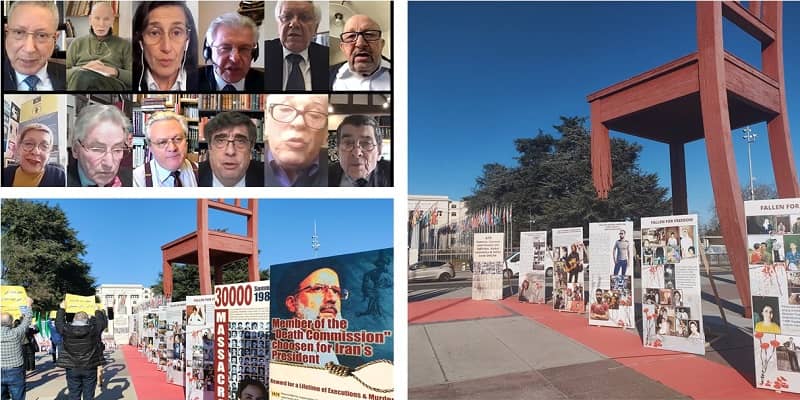
On Monday, February 28, 2022, the United Nations Human Rights Council began their 49th session, via a virtual conference, to discuss and raise concerns over the critical human right situation in Iran.
At the same time as the conference took place, a rally was taking place outside the UN’s European headquarters in Geneva, calling for action to be taking in regard to Iran’s 1988 massacre.
During the conference, former UN judges, special rapporteurs, UN officials, and a number of human rights experts were in attendance, calling for the UN to conduct an independent investigation into the 1988 massacre. The massacre saw over 30,000 political prisoners being brutally executed, in an act of genocide, with the majority of prisoners being supporters of the Iranian opposition group, the People’s Mojahedin Organization of Iran (PMOI/MEK).
The National Council of Resistance of Iran (NCRI) said, “The conference comes weeks after a historic open letter by some 470 prominent former UN judges and special rapporteurs to the Council and Michelle Bachelet, the UN High Commissioner for Human Rights, calling for an investigation into the 1988 genocide, mainly the role of the Iranian regime’s current president Ebrahim Raisi.”
At the time of the massacre, Raisi was serving on a panel of judges in Tehran, known as the ‘Death Commission’, which was formed after the Iranian regime’s then-Supreme Leader Ruhollah Khomeini issued a fatwa condemning all members of the MEK to their deaths.
In addition to discussing the dire human rights situation in Iran, the participants of Monday’s conference also discussed the dramatic rise in the number of people being executed across the country, as well as the international community’s response to these issues.
Tahar Boumedra, the former Director of the Human Rights Office of the UN’s Assistacne Mission in Iraq, explained that the purpose of the fatwa was to ‘exterminate all those prisoners’ who had refused to denounce their support of the MEK. He said, “The 1988 massacre was a premeditated crime.”
The Vice President of the French Parliamentaty Group for a Free Iran, Herve Saulignac made reference to the regime’s ‘systematic impunity’, protecting them from being held accountable for their crimes against humanity. Discussing Ebrahim Raisi’ rise to the presidency, Saulignac emphasized that, “this impunity cannot persist more than this.”
Iranian lawyer, Hamid Sabi, who was the organizer for the Iran Tribunal, stated the fact that the 1988 massacre was a ‘grave case of crime against humanity’ and shared that it was the silence of the international community for the past 43 years that has emboldened the regime to continue its human rights violations.
Professor Valeriu M. Ciuca said, “I have deep sympathy for the families of the victims of the 1988 massacre. Justice must prevail in the name of universal morality.”
Gilbert Mitterrand, the president of France Libertés, who co-hosted the conference, addressed the other participants, saying, “It has taken many years to bring justice to the 1988 massacre because governments failed to do their job. We are far from the objectives of the UN! The voice of democracy is a weapon, and we must use it.”
Talking about the human right situation in regards to Iranian women, Sarah Noury, a member of the Paris Bar Association, warned that, “The Iranian regime’s laws are misogynist and directly affecting Iranian women and girls. Under the ruling theocracy, women will have no protection.”
When the time comes to finally hold the regime accountable for their history of human rights abuses, one of the methods most likely to be used will be by applying the Universal Jurisdiction, which allows countries around the world to apprehend any of the perpetrators on foreign soil. This principle has already been used recently in the case of Hamid Noury, a former Iranian prison official.
Noury was arrested upon arrival to Sweden in 2019 for his role in torturing, and leading political prisoners to the gallows during the 1988 massacre during his tenure at Gohardasht Prison in Iran. His trial is currently ongoing until next month at a court in Stockholm.
The NCRI said, “Monday’s conference and its panellists once again highlighted the international community’s obligations to hold Iran’s genocidal regime to account for its crimes against humanity. They called for a firm approach toward the Iranian regime and underlined the urgency of an independent inquiry into the 1988 massacre and other crimes by Iran’s ruling theocracy.”